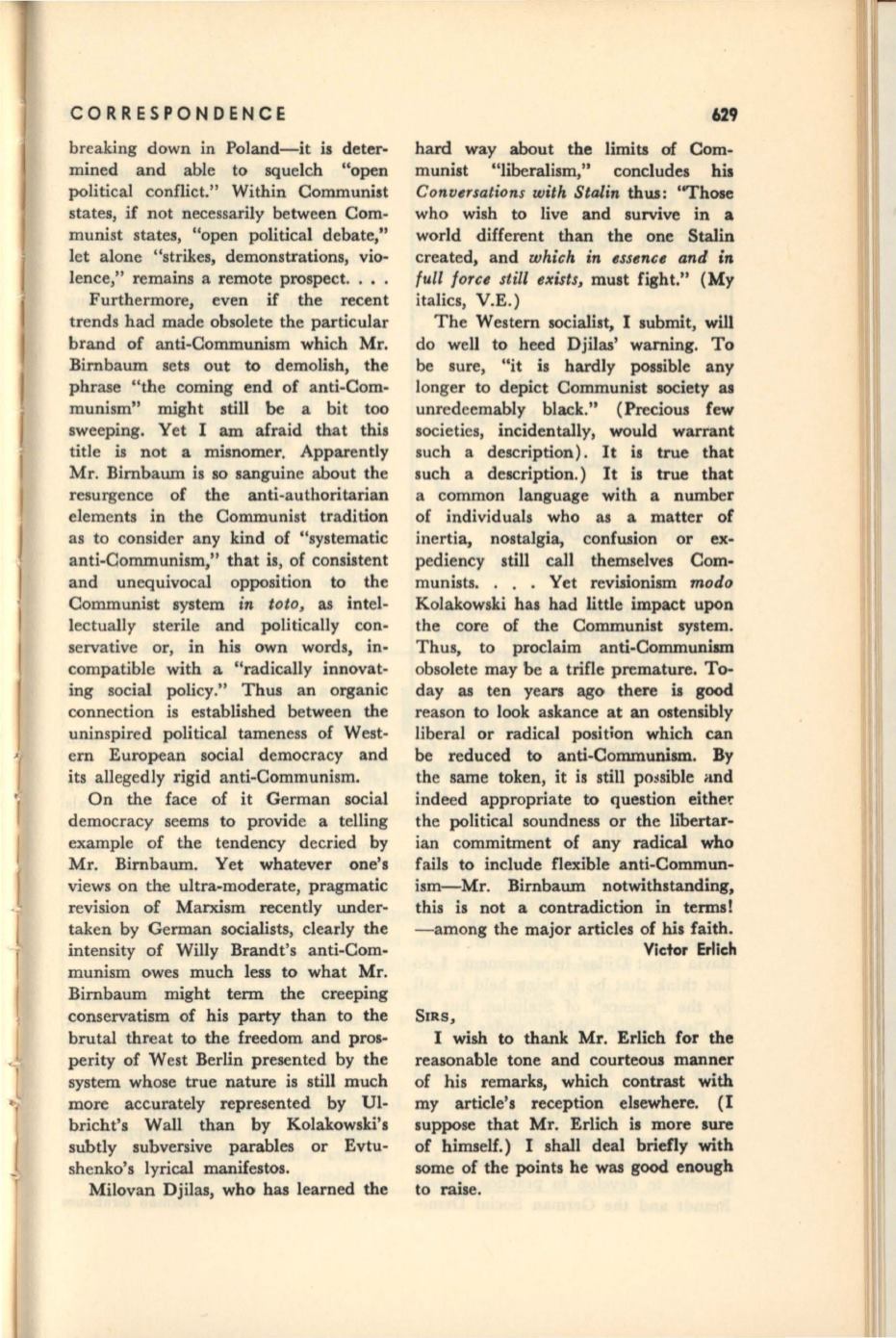
CORRESPONDENCE
breaking down in Poland-it is deter–
mined and able to squelch "open
political conflict." Within Communist
states, if not necessarily between Com–
munist states, "open political debate,"
let alone "strikes, demonstrations, vio–
lence," remains a remote prospect....
Furthermore, even
if
the recent
trends had made obsolete the particular
brand of anti-Communism which Mr.
Birnbaum sets out to demolish, the
phrase "the coming end of anti-Com–
munism" might still
be
a bit too
sweeping. Yet I am afraid that this
title is not a misnomer. Apparently
Mr. Birnbaum is so sanguine about the
resurgence of the anti-authoritarian
elements in the Communist tradition
as to consider any kind of "systematic
anti-Communism," that is, of consistent
and unequivocal opposition to the
Communist system
in toto,
as intel–
lectually sterile and politically con–
servative or, in his own words, in–
compatible with a "radically innovat–
ing social policy." Thus an organic
connection is established between the
uninspired political tameness of West–
ern European social democracy and
its allegedly rigid anti-Communism.
On the face of it German social
democracy seems to provide a telling
example of the tendency decried by
Mr. Birnbaum. Yet whatever one's
views on the ultra-moderate, pragmatic
revision of Marxism recently under–
taken by German socialists, clearly the
intensity of Willy Brandt's anti-Com–
munism owes much less to what Mr.
Birnbaum might term the creeping
conservatism of his party than to the
brutal threat to the freedom and pros–
perity of West Berlin presented by the
system whose true nature is still much
more accurately represented by Ul–
bricht's Wall than by Kolakowski's
subtly subversive parables or Evtu–
shenko's lyrical manifestos.
Milovan Djilas, who has learned the
629
hard way about the limits
of
Com–
munist "liberalism," concludes his
Conversations with Stalin
thus: "Those
who wish to live and survive in a
world different than the one Stalin
created, and
which
in
essence and, in
full force still exists,
must fight." (My
italics, V.E.)
The Western socialist, I submit, will
do well to heed Djilas' warning. To
be sure, "it is hardly possible any
longer to depict Communist society as
unredeemably black." (Precious few
societies, incidentally, would warrant
such a description). It is true that
such a description.) It is true that
a common language with a number
of individuals who as a matter of
inertia, nostalgia, confusion or ex–
pediency still call themselves Com–
munists. . . . Yet revisionism
modo
Kolakowski has had little impact upon
the core of the Communist system.
Thus, to proclaim anti-Communism
obsolete may be a trifle premature. To–
day as ten years ago there is good
reason to look askance at an ostensibly
liberal or radical position which can
be reduced to anti-Communism. By
the same token, it is still possible and
indeed appropriate to question either
the political soundness or the libertar–
ian commitment of any radical who
fails to include flexible anti-Commun–
ism-Mr. Birnbaum notwithstanding,
this is not a contradiction in terms!
- among the major articles of his faith.
Victor Erlich
SIRS,
I wish to thank Mr. Erlich for the
reasonable tone and courteous manner
of his remarks, which contrast with
my article's reception elsewhere. (I
suppose that Mr. Erlich is more sure
of himself.) I shall deal briefly with
some of the points he was good enough
to raise.


